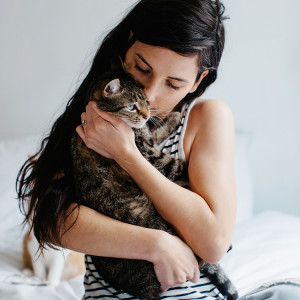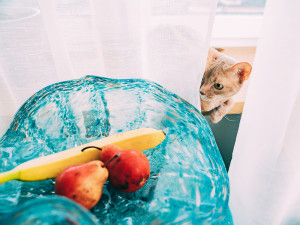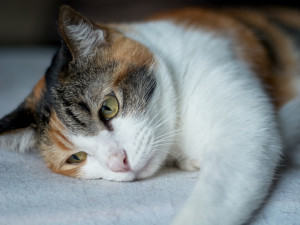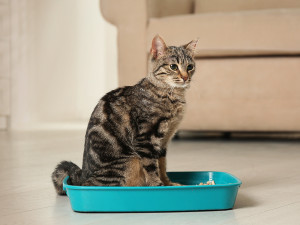Why Does My Cat Wake Me Up At the Crack of Dawn?
Here’s what to do when your cat starts pawing at your face before the sun has even come up
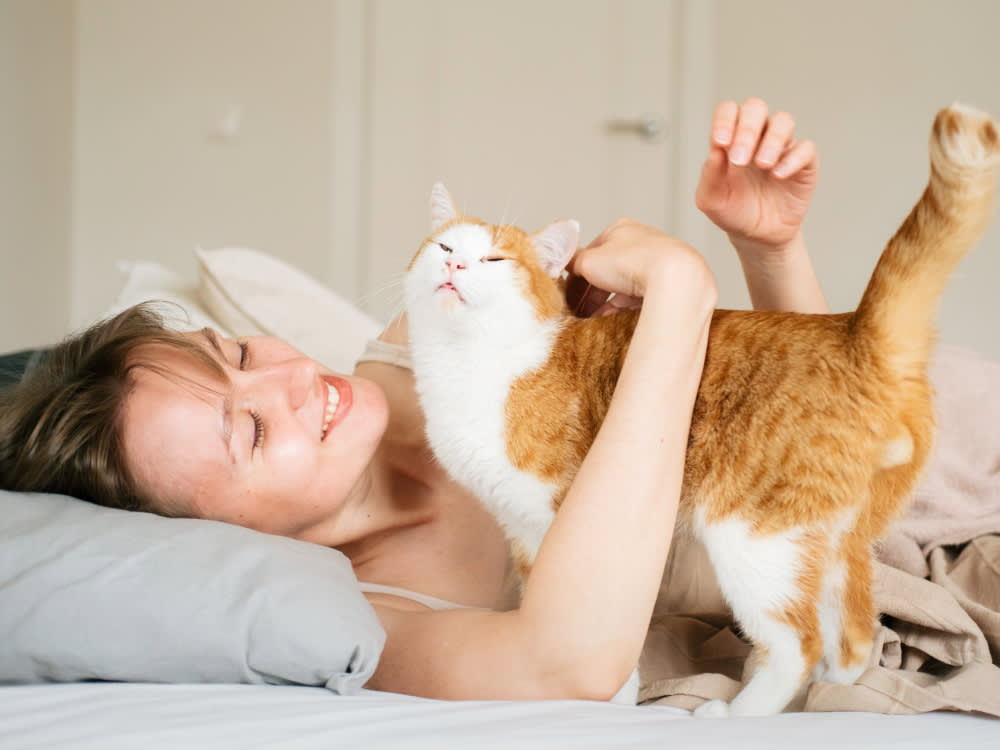
Share Article
My cat, Pumpkin, is a monster. A snuggle monster, but a monster nonetheless. Every morning, as the sun rises, so too does Pumpkin. He walks across my chest, sticks his paw in my mouth, meows, purrs and cuddles up beside me, forcing his way into whatever nook I have created with my body and cuddling contentedly for about a minute before getting bored and aggressively grooming himself. All the while, he’s chewing at his belly fluff like a dog attacking a stuffed animal. If I roll away from him for a little peace, he trots around my body and sits on my face. If I move again, so does he. When I try to check my phone, he lays on my arm and/or tries to knock the device out of my hand with his head. And on and on it goes, until I finally get up and un-can his food – usually around 7.30am. He doesn’t eat it then; he just licks all the gravy off the top and then lies down by my workstation, letting me know it’s time to start writing like the cheeky little taskmaster he is.
Having a cat who wants to get a jump on the day is hardly the worst problem to have. But it is annoying and I would like to be able to sleep in on occasion, so I reached out to a feline behaviour consultant, Cristin Tamburo, for a little insight as to why Pumpkin (and every other cat) does this sort of thing and how to stop it. “Cats are a crepuscular species,” she says. “Meaning they are most active at dusk and dawn. Many of their predators are less active during these times, so it allows them to hunt more freely and safely. So, by nature, they are going to be on a different schedule than most of us.” Well, that clears a few things up. Now, Tamburo on what to do about it...
But why does he have to involve me?
Many of the undesired behaviours that cats engage in are attention-seeking in nature and often sparked out of boredom. If your cat is waking you up early, they could be hungry (training you to get up and feed them) or they might just be bored, as this is when they would typically be hunting in the wild. In some cases, there may be another animal outside that becomes active during those hours, causing some territorial anxiety.
Is there anything I can do to change this behaviour?
If the behaviour is attention-seeking in nature, it’s important to pay as little attention to it as possible. This is often easier said than done, but if your cat is trying to get you to play with them or feed them and you do it, you are absolutely reinforcing that behaviour.
If the issue is boredom, giving cats a good play session just before bed can help wear them out, fulfil some of their hunting needs, and hopefully help both of you sleep more soundly. Feeding after this play session can also help keep them satiated overnight, potentially reducing the need to wake you up early for food. You can also put out some interactive toys for them to play with during the night and try hiding treats around the house before bed to help them fulfil those hunting needs.
What about an automatic feeder?
I got an automatic feeder a few years ago and it has changed my life! I have seven cats and, being a feline behaviourist, I know I’m supposed to ignore them when they try to wake me up for breakfast, but I’m just not strong enough – especially not at 4.45am. But with the feeder, they get to eat at 4.30am and then come back to bed to snuggle for a few hours.
Are there any situations when my cat waking me up early should be cause for concern?
If this is a new behaviour, my first recommendation is always a trip to the vet to ensure there are no underlying health issues. In the case of overnight, excessive vocalisation, thyroid issues or cognitive dysfunction are often the cause, but can only be properly diagnosed by a vet.

Charles Manning
Charles Manning is an actor, writer, and fashion/media consultant living in New York City with his two cats, Pumpkin and Bear.
Related articles
What to Know About Runny Noses in Cats
Nasal discharge doesn’t sound cute, but you need to know what to look out for
![Maine coon cat using the litter box.]()
Uncovered Secrets: Why Cats Don’t Always Cover Their Poo
And how you can encourage them to cover up after doing their business
![Cat sitting in a teal litter box]()
Mastering the Art of Litter Box Training: How to Train Cats to Use a Litter Box
If you do nothing else, teach your cat to poo in their litter box (and not in your shoe)
![grey and white cat with tongue sticking out]()
Why Is Your Cat Vomiting Like They Partied All Night?
Here’s when you should worry if your cat is throwing up
